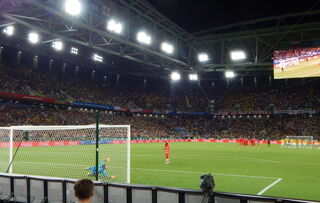Stress
Is Life a Lottery? Soccer Penalty Shootouts, Chance, and Stress
What can sports psychology and penalty shootouts teach us about stress cures?
Posted July 12, 2021 Reviewed by Kaja Perina
Key points
- Believing 'life is a lottery' can influence performance in high stakes predicaments, often for the worse
- People who keep failing at a particular task may become victim of the 'self-fulfilling prophecy' where they expect to underperform
- In high stress moments dividing the whole event into separate time frames with different strategies for particular moments works best
- Examine where you are successful in life and analyse what makes those moments different from when you tend to perform less well
England crashed out from a major soccer tournament through failing a penalty shootout, cementing a reputation the national team have for fluffing under stress.

Researchers at German Sport University Cologne, Germany, recently published an in-depth statistical analysis of soccer penalty shootouts, and English players performed worse in shootouts (scoring 61.32% of the time) than in in-game penalties during World- and European Championships (90.00% score rate) and European leagues (75.14%).
England scored 90.00% of in-game penalties while Germany sunk to 75.00%, Italy 65.00%, Brazil 87.5%.
English players perform on average almost 30 percent worse in shootouts than for in-game penalties; with Germany performing 10 percent better in shootouts than in-game penalties.
English players are therefore not that bad at penalties during the flow of normal time, but appear worse at shootouts after extra time is over, which all suggests psychology becomes crucial.
Maybe the negative stereotype of “English football players being bad at penalties”, even acts as a kind of self-fulfilling prophecy, contributing to English players actually performing worse at this particular moment.
The Psychological Power of the Self-fulfilling Prophecy
The authors argue that maybe over the years the reaction to repeated failure, despite relentless attempts at better preparation, has led to a prevalent belief amongst English coaches, players and supporters, that penalty shootouts are a ‘lottery’.
If you believe the outcome of an event is simply due to chance, (Fabio Capello, a former England Manager even actually said, “Penalties are a lottery”), how do you prepare for it?
The problem then is this very belief may mean a team does not prepare adequately, contributing to poorer performance.
How do you combat the problem of the ‘lottery’ conviction which leads to a self-fulfilling prophecy?
One answer comes from a study entitled, ‘On winning the “lottery”: Psychological preparation for football penalty shoot-outs’ published in the Journal of Sports Sciences. This suggests it is vital to have a plan rooted on the idea that small increments of loading the dice your way, is crucial to improved self-confidence, leading to a positive spiral out of the negative self-fulfilling prophecy.
For example, the authors point to research which finds that 82% of those players who substantially celebrated their successful penalty, ended up on the winning team. Such positive displays of emotion appear contagious, infecting a positive attitude on team-mates taking subsequent kicks. Such revelries also seem to have a negative effect on the opposition. Specifically, when players displayed substantial celebrations, the opposing team were more than twice as likely to miss their next shot.
There is Usually More You Can Do Than You May Realise
The authors also argue that a shot struck with typical speed to the corners of the goal should reach the goal in around 600ms, and therefore should be physically impossible for the goalkeeper to save, given constraints on their reaction time. Scientific analysis of shots directed toward the upper third of the goal have a save rate of 0%; yet only 13% of shots are hit to these areas, probably due to the inflated risk of missing the goal completely, and players fear of missing.
It is the fear of error which then leads to too central a shot, which is more likely to be saved, back to the self-fulfilling prophecy.
Different Stresses At Different Times
In terms of stress management, also, there are in fact four distinct phases of the penalty shootout. There is the break after extra-time prior to the shootout beginning; standing in the centre circle during the shootout waiting for your turn to shoot; that ‘long’ walk to the penalty mark; and only finally, the shot itself.
Players confirm that the most stressful phases are the break after extra time that precede the start of the shootout, and the time interval between the shootout beginning and the player’s turn to shoot. This is possibly because there is less happening during that time to distract a player from brooding on failure.
Therefore, these are the key time periods where a psychological strategy should be developed where team mates help each other remain relaxed and focused on the task at hand.
Where To Look When Facing An Adversary
A key issue is the adversarial nature of facing the goalkeeper eyeball to eyeball, but maybe too many players become afraid to look away?
The scientific research confirms that aligning gaze with aiming intention promotes more accurate shooting. Not focusing on the target, and instead concentrating on the goalkeeper impairs accuracy.
But anxious, players tend to be distracted by the centralised goalkeeper and spend significantly longer looking in this location, and this disruption to focus is increased if the goalkeeper actively attempts to attract the kicker’s attention with off-putting behaviours, such as waving their arms.
Being side-tracked by looking at the goalkeeper has been found by research to result in shooting more centrally with correspondingly poor results.
Instead, the evidence is that focusing on optimal target areas of the goal (top-corners) for a sufficient amount of time, in order to process the aiming information needed for accurate shooting, is key.
Yet players may be reluctant to do this because they think it signals to the goalkeeper where they are going to place the ball. Even if that is the case, the ability of the goalkeeper to get to that corner is slim, statistically, also the evidence is that goalkeepers generally use information from lower limb movements of the kicker to aid their anticipation, rather than the kicker’s gaze.
An accurately struck shot to the corners of the goal should be almost impossible for the goalkeeper to save regardless; unless they dive really early which then leaves enough time for the kicker to change kick direction.
Practice for Success By Putting Yourself Under More Pressure During Rehearsal
One of the common criticisms of the limits of practice when it comes to penalty shootouts is that it is impossible to recreate the anxiety experienced in real competition. Yet psychologically attuned coaches can also manipulate anxiety through inviting audiences such as press and supporters to watch penalty shootout practice, prior to competition.
The father of the tennis prodigies, the Williams sisters, it is said, often made them play in tough conditions on courts located in dangerous neighbourhoods, where they had to learn not to be distracted by gunshots. After that someone shouting from the crowd in Wimbledon is a breeze. It is said sometimes they had to return 500 volleys just to earn a rest for the evening.
If the training and preparation is tough enough then you can turn any high pressure predicament into something less stressful.
Even If Life Is A Lottery - How To Buy More Tickets and Up Your Chances
Yes, life is partly a lottery, with chance playing a role. Events are never entirely under your own control.
But the lesson from the research on penalty shootouts is that you can increase your chances with the right mental preparation, and, partly, this involves not being convinced it is an entire lottery.
Focus on what you can do, and don’t let what you can’t prey on your mind.
References
Brinkschulte, M., Furley, P. & Memmert, D. English Football Players are not as Bad at Kicking Penalties as Commonly Assumed. Sci Rep 10, 7027 (2020). https://doi.org/10.1038/s41598-020-63889-6
Wood, G., Jordet, G. & Wilson, M. R. On winning the “lottery”: Psychological preparation for football penalty shoot-outs. J. Sport Sci. 33, 1758–1765 (2015)




